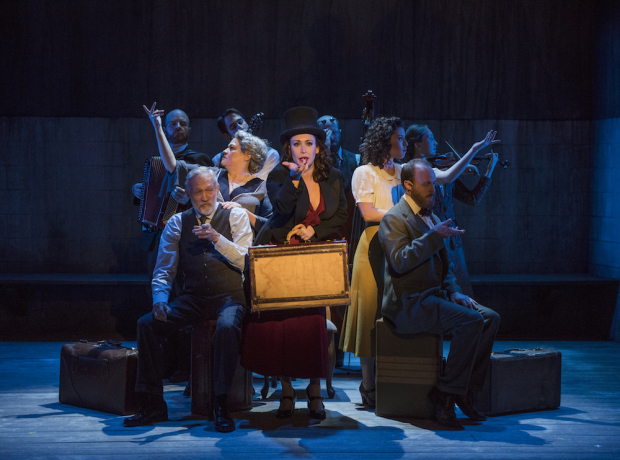Like a Phoenix, Indecent Rises From the Ashes

(© Michael Brosilow)
In the first moments of Paula Vogel's Indecent, playing at Victory Gardens, a troupe of actors gather, untidy in worn traveling coats. As they move toward the audience, streams of dust fall from their sleeves. A phrase is projected onto the stage: "From ashes they rise." It is a promise that we will see a story of hardship, but also one of resurrection.
Indecent follows the real-life history of God of Vengeance, a Yiddish drama by playwright Sholem Asch (Noah LaPook). His play, set in a brothel, featured Jewish pimps and prostitutes, the desecration of a Torah, and a tender romance between two young women (Catherine LeFrere and Kiah Stern). Its debut run in 1907 shocked and moved Warsaw audiences, then became an international hit. After World War I, Asch, now a United States citizen, brought God of Vengeance to New York — but to appease the Puritanical sensibilities of Broadway audiences, the spirit of the play was twisted in translation. Transformed into a morality play wherein one wicked woman seduces and perverts a devout young girl into sin, God of Vengeance opened at the Apollo Theatre in 1923. Despite the censorship of its themes, the play proved controversial, and the producer and cast were arrested on obscenity charges.
Every step of the way, God of Vengeance was stage-managed by a man named Lemml (Benjamin Magnuson). After the obscenity trials end in conviction, Lemml, disillusioned by Asch's complacency in the face of censorship, returns to Poland, vowing to champion the original Yiddish script. A later scene takes place in 1943 in the Łódź Ghetto. Lemml is still producing the play in attics, drawing rooms, and wherever else he can fit an audience, until his story ends as we know it must: lost to Nazi brutality. "From ashes they rise."
Under the direction of Gary Griffin, the ensemble of seven actors and two musicians are tasked with playing over 40 characters. As actors flit from role to role, the changes are not always clearly delineated, leading to occasional confusion. Stern in particular suffers from lack of specificity as she moves from playing one ingenue role to another, but when she is Rifkele, the young girl in the show-within-a-show, she is splendid. LaPook gives a strong performance, portraying Sholem Asch as his youthful enthusiasm grows into embitterment and paranoia. But it is Magnuson who is the beating heart of the play as the earnest Lemml, whose devotion to God of Vengeance shapes his life.
Simple costumes in neutral tones by Mara Blumenfeld allow the play to move through the decades easily, and Keith Parham's lighting design helps differentiate between the show and the dreamlike show-within-a-show. Clear, tasteful projections by Stephan Mazurek are reminiscent of intertitles in silent cinema, particularly for the musical interludes, performed primarily in Yiddish and accompanied by Elleon Dobias on violin and Matt Deitchman on accordion.
Vogel's play is an ode to the transformative power of theater, without the self-indulgence and inside jokes that often plague plays about show business. Even a brief cameo from Eugene O'Neill (LaPook again) is insulated from wink-nudge novelty. Aided by Griffin's straightforward staging, Indecent tells its story honestly and without pretense. Though the themes of God of Vengeance — homosexuality, prostitution, and blasphemy — no longer shock modern audiences, the themes of Indecent still move us today.










